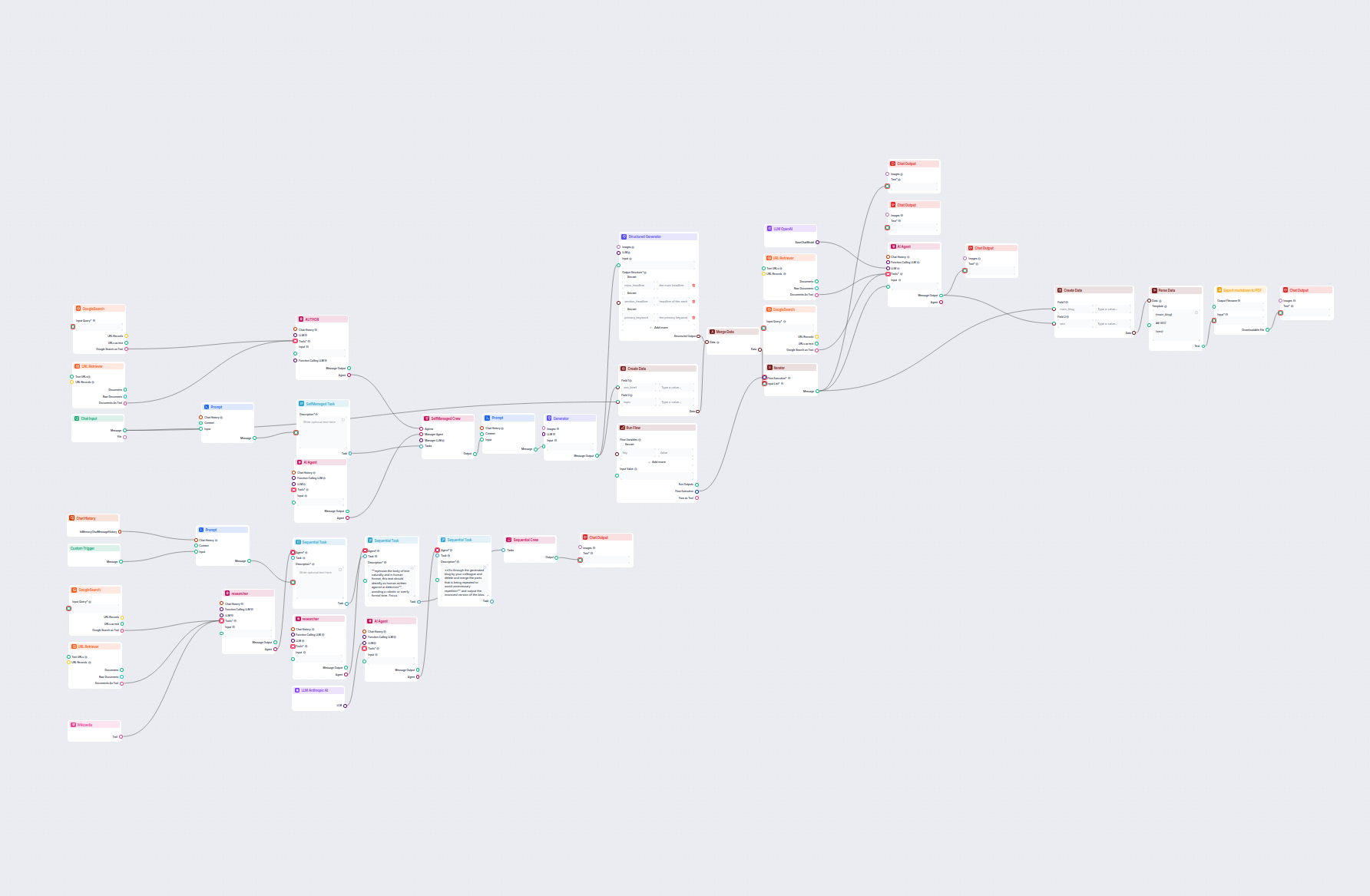
Sequential Crew
Let entire teams of AI coworkers handle complex tasks. Learn more about creating agent crews with the Sequential Crew component in FlowHunt.

Discover how GPT-4o-mini, integrated into CrewAI, delivers high-quality blog briefs at a fraction of the cost, making it the ideal OpenAI model for efficient, affordable AI research and content creation.
Let’s quickly revisit the CrewAI workflow illustrated in the image provided earlier. While adaptable to various tasks, for generating blog briefs, the core concept remains:
This setup allows for efficient and focused research, culminating in a well-structured blog brief.
Initially, we leveraged the full power of GPT-4o across all our CrewAI agents. The results, as seen in the sample output, were undeniably high-quality. Here’s an excerpt from a blog brief generated using GPT-4o (at a cost of 1.2 credits):
Page Title: Harnessing AI Tools in Education: A Comprehensive Guide
Page Meta Description: Explore the transformative role of AI tools in education, from enhancing learning experiences to addressing ethical challenges. This guide provides educators with insights, practical applications, and the future of AI in classrooms.
Introduction: Artificial Intelligence (AI) is reshaping education by providing innovative tools that enhance learning experiences, personalize student interactions, and streamline administrative tasks.
The brief is comprehensive, well-written, and covers all the key areas we’d expect. However, at 1.2 credits per brief, the cost can quickly become a concern when scaling up content creation.
Enter GPT-4o-mini. We integrated it into our CrewAI team, assigning it to roles responsible for generating the bulk of the content within the brief. The results were astonishing. Here’s an excerpt from a blog brief generated using GPT-4o-mini (at a cost of a mere 0.15 credits):

0:05
Thought: Compare the environmental impact of electric vehicles with that of hydrogen-powered cars, focusing on factors such as energy production, vehicle lifecycle, and emissions.

0:07
The agent receives a more specific prompt:
Can you provide a detailed comparison of the environmental impact of electric vehicles versus hydrogen-powered cars? Please include information on energy production, vehicle lifecycle, and emissions.

0:16
The agent then asks itself a question:
What are the environmental impacts of energy production for electric vehicles compared to hydrogen-powered cars?
Repeat (the same timeline/steps are shown repeatedly, indicating a detailed agent thought process and self-questioning)
Exploring AI Tools: Transforming Education for the Future
This educational textbook delves into the diverse AI tools shaping the future of learning. Explore their applications, benefits, ethical implications, and practical guidance for educators and students alike.
Artificial Intelligence (AI) is revolutionizing the educational landscape, providing innovative tools that enhance teaching and learning experiences. This textbook aims to equip educators and students with a comprehensive understanding of AI tools, exploring their functionalities, benefits, and ethical considerations. As AI continues to evolve, it is essential to grasp how these technologies can be effectively integrated into educational practices. This textbook serves as a valuable resource for understanding and utilizing AI tools in the classroom.
What are the most popular AI tools for education?
How can AI tools personalize learning experiences?
What challenges do educators face when implementing AI tools?
How do AI tools enhance student engagement?
Can AI tools replace traditional teaching methods?
What role does data privacy play in the use of AI tools?
How can educators measure the effectiveness of AI tools?
What resources are available for learning more about AI tools?
Total Word Count: Approximately 3500 words
This content brief outlines the essential components and key information required for an educational textbook about AI tools, ensuring clarity and value for high school readers. Each section provides specific instructions and word counts to guide the author in creating a comprehensive and engaging resource.
While there are subtle differences in phrasing and structure, the GPT-4o-mini brief is remarkably similar in quality to the GPT-4o version. It covers the same core concepts, provides a solid foundation for a blog post, and achieves this at 8 times lower cost!
Let’s break down the cost implications:
This means you can generate eight blog briefs with GPT-4o-mini for the same cost as one brief with GPT-4o. This is a game-changer for content creators, researchers, and anyone looking to leverage AI for generating high-quality content outlines efficiently.
While our focus was on OpenAI models, options like Claude 3 Sonnet, Llama 3 70B, and Gemini Pro 1.5 exist. However, for generating blog briefs with CrewAI, GPT-4o-mini demonstrated the most compelling balance of quality and affordability within the OpenAI ecosystem.
Our research has led us to a clear conclusion:
When working with OpenAI models, GPT-4o-mini, strategically deployed within a CrewAI framework, is the most cost-effective solution for generating blog briefs. The sample outputs demonstrate that it delivers exceptional quality at a dramatically reduced cost compared to GPT-4o.
If you’re looking to build an AI-powered research team for content creation and prefer to use OpenAI’s technology, GPT-4o-mini is the clear choice. It empowers you to generate high-quality blog briefs efficiently and affordably, maximizing your resources and streamlining your content creation workflow. The savings are simply too significant to ignore.
GPT-4o-mini delivers similar quality to GPT-4o for generating blog briefs within CrewAI, but at one-eighth the cost, making it ideal for scalable, efficient content creation.
CrewAI uses a team of specialized AI agents (such as an SEO Expert and Researcher), which autonomously collaborate, guided by a central AI Agent, to efficiently gather data, process information, and generate structured blog briefs.
Yes, GPT-4o-mini can be adapted for various AI research and content generation tasks within CrewAI, providing an excellent balance of quality and cost for a wide range of applications.
While alternatives exist, GPT-4o-mini demonstrated the best blend of affordability and content quality for blog brief creation within the OpenAI ecosystem, according to the article’s tests.
Content creators, researchers, educators, and teams seeking efficient, high-quality, and affordable AI-powered content outlines or research briefs will benefit most from this setup.
Arshia is an AI Workflow Engineer at FlowHunt. With a background in computer science and a passion for AI, he specializes in creating efficient workflows that integrate AI tools into everyday tasks, enhancing productivity and creativity.
Ready to streamline your content creation with affordable, powerful AI? Experience how CrewAI and GPT-4o-mini can revolutionize your workflow.
Let entire teams of AI coworkers handle complex tasks. Learn more about creating agent crews with the Sequential Crew component in FlowHunt.
Let teams of AI coworkers handle complex tasks. Discover how FlowHunt's SelfManaged Crew component enables AI agents to collaborate like real teams, boosting ef...
Generate comprehensive, SEO-optimized blog posts with advanced structure and high word count using multiple AI agents. The workflow includes automated research,...
Cookie Consent
We use cookies to enhance your browsing experience and analyze our traffic. See our privacy policy.



